Veneers in Brazil
Search and Compare the Best Clinics and Doctors at the Lowest Prices for Veneers in Brazil

Find the best clinics for Veneers in Brazil
With Medijump you can browse 11 facilities offering Veneers procedures in Brazil. The cheapest price available is $300 in Rio de Janeiro. And for the cheapest price globally, prices start from $1 in Vietnam.
Veneers in Rio de Janeiro
Price: $ 300
Veneers in Sao Paulo
Price: $ 850
Vietnam offers the best prices Worldwide
Price: $ 1
From 12 verified reviews
Otavio Sant Anna, 16 April 2023
Amazing clinic and top notch service. Especially Dr. Andrezza who was very patient with my fear of the dentist. Thank you all and congratulations for the excellent work!
From 4 verified reviews
Rafi Aamer, 23 March 2022
I travelled to Brazil to get the dental treatment done with Dr. Luis Gustavo. The treatment was exceptional and beyond my expectations. The office and the staff not only cared for me in the clinic but outside the clinic as well. I was treated more as a guest than a patient. I am extremely satisfied and would happily recommend the service to everyone.
Dds Marco Rocha e Carla Simone, located in R Real Grandeza, Rio de Janeiro, Brazil offers patients Veneers procedures among its total of 7 available procedures, across 1 different specialties. The cost of a Veneers procedure ranges from $590 to $690, whilst the national average price is approximately $698. There are many specialists available at the Dental, with 4 in total, and they are not accredited by any recognized accreditations institutes
From 17 verified reviews
Rod Brown, 09 September 2020
I encountered Dr. Rowan Vilar because of a recommendation from a trusted friend. And although both the global pandemic and the impact that had on my very local wallet, prevented me from experiencing treatment under his care ... please allow me a moment to express why he would have been my first choice.I’ve been suffering for about a decade with poor dental health, so much so that the dental professionals in the Atlanta area would not perform regular scheduled maintenance cleanings, for fear of a malpractice suit. I don’t have dental insurance and it has taken years for me to save the money needed to address my oral health.I’ve searched several destinations abroad and even though Dr. Vilar’s wasn’t the least expensive, his review of my current health status and plan to restore me to good health was and remains BY Far, the most comprehensive, the easiest to understand, the most thought out, the most focused on both the physical and mental aspects of oral health, the most attuned to my specific satisfaction and the most considerate of my specific circumstances, that stood as a challenge for me, on the road to alleviating my dental pain and improving my oral health.Here’s how.I contacted his office on a weekend and received a return call before the weekend had ended. We shared 2 or 3 conversations at length, regarding my current status. In those conversations we covered everything from the problems I was experiencing, to how I felt about appearance to what had prevented me from addressing the issues until now.After gathering the information, he expressed a need for X-Rays, Pictures and I also had a topographical CD available. I sent it all to him and we scheduled a follow up ZOOM call for a few days later.I am NOT the most tech savvy senior citizen in the world and Dr. Vilar was very patient with and helpful to me as I struggled via WhatsAPP and ZOOM to connect ... but finally, when I did ... it was So Very Worth My While!Dr. Vilar had prepared a presentation using my photos and that of successful projects he’d previously completed, to detail for me exactly what needed to be done and what I could expect as a finished product. He informed me of the extractions that were needed, those teeth he’d try to save and why ... as well as, the orthodontics and implants that were required to best restore my health. He not only explained what was needed but also why it was important. He addressed the timeline and commitments and was prepared to assist me with finding accommodations during my stay.His English is flawless, pertinent because my Portuguese is non-existent! And, his communication style is very thorough. We’ve interacted for about a month and a half, with him checking in on my progress approximately every two weeks after our initial Zoom consultation before I realized that even though his fees were reasonable, less than half of what I was quoted in the u.S., and despite the fact that his proposed solution was by far the best ... I simply couldn’t afford the best!That said, if I could have ... I most certainly would have. After having searched for nearly a decade and about a dozen countries in both europe and south of the u.S. border, Dr. Vilar’s practice appears to be among the very best on the planet!
From 12 verified reviews
ludmilla maximiuc, 20 September 2020
Melhor botox que já fiz na vida!!!! Super recomendo!!!!A parte de ortodontia infantil tb é maravillosa!! Confiança de olhos fechados!!!!
From 5 verified reviews
Leide Gallozio, 15 September 2020
Pleasant place, total hygiene and great professional.
From 156 verified reviews
Márcio Kosarczuk Bahy, 20 September 2020
Very friendly hospital.
Alexander Hohn, located in R Real Grandeza, Rio de Janeiro, Brazil offers patients Veneers procedures among its total of 42 available procedures, across 2 different specialties. The cost of a Veneers procedure starts from ฿44,200, whilst the national average price is approximately ฿25,128. All procedures and treatments are undertaken by just a small team of specialists, with 2 in total at the Clinic, and they are not accredited by any recognized accreditations institutes
From 11 verified reviews
Arte dos Marques, 17 June 2019
I was very well attended in my implant procedure and also in other appointments excellent professional support first class. I recommend.
From 3 verified reviews
Marina Freire, 08 September 2020
I would like to thank Dr. Gustavo for his work.I spent a lifetime detesting my smile and now I am very very very satisfied and happy.Thank you!
From 2 verified reviews
Firmino Freitas Reis Filho, 11 September 2019
Excellent professional, very well prepared, very intelligent, kind, polite, attentive. I underwent root canal treatment, very light hand ... it's an 11 note!
- Home
- Brazil
Compare Before & After Photos of _procedure_photos.phpVeneers
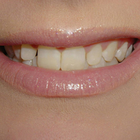
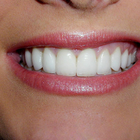
Front view
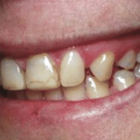
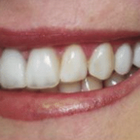
Half-side view
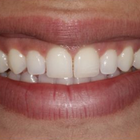
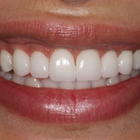
Front view
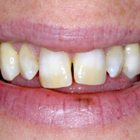
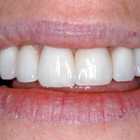
Front view
WHY US?
At Medijump, we're making medical easy. You can search, compare, discuss, and book your medical all in one place. We open the door to the best medical providers worldwide, saving you time and energy along the way, and it's all for FREE, no hidden fees, and no price markups guaranteed. So what are you waiting for?

Free

Best Price

Widest Selection

Risk-Free
What you need to know about Veneers in Brazil

Dental veneers are thin covers that are attached to the surface of teeth to enhance their appearance. The non-invasive dentral procedure is previously popular among those with damaged or discolored teeth. Nowadays, however, the procedure is seen as the ideal method of achieving the ‘perfect smile.'
Veneers can be used to hide uneven, misaligned or simply imperfect teeth. The veneers are cemented over the existing teeth and fixed into place – there are two main types of veneer; Porcelain and Composite. Porcelain veneers are more expensive and appear more natural, being made in a laboratory so require multiple visits. There is often the need to alter the existing teeth, removing some of the mass. Composite veneers are made of the same materials used for cavity fillings. They can usually be made quickly, and are sculpted directly on the teeth instead of in a laboratory. Thus allowing the procedure to be done in a day.
What does a Veneers Procedure Involve?
Veneers are used primarily for aesthetics. This type of treatment procedure is perfect for people who have gaps in their teeth, stains, as well as people who may have chipped a tooth. Veneers are custom-made shells designed to fit the shape of your teeth and to be attached to your front teeth to improve the size, shape, color, and length.
Two main types of veneers are:
- Composite Veneer - this type can be created by your dentist on the same day and directly applied to your teeth. You will only need a single appointment to complete the procedure.
- Porcelain Veneer - this type is manufactured in a laboratory. Opting for a porcelain veneer will require you to have two appointments. First, is to prepare your teeth (enamel removal) and mold a model of your teeth to be created in the lab. The second is to finally cement your veneers onto your teeth.
The most commonly used type of Veneer is the Porcelain Veneer as it appears more natural and can resist stains better than composite veneers. Besides the two main types of veneers, some dentists may also offer no-prep veneers. These may include specific brands of procelain veneers like Vivaneers and Lumineers. They are less invasive to apply since the layers of tooth under the enamel aren't removed.
In terms of anesthetics, local anesthesia is not usually required while undergoing the whole procedure. However, depending on how you handle pain and discomfort, you may request to receive local anesthesia or sedation.
Aside from giving you a pleasing smile, veneers are resistant to staining and offer the best fix to broken or damaged teeth.
How Long Should I Stay in Brazil for a Veneers Procedure?
This type of procedure is an outpatient treatment, meaning you may be able to go home after undergoing the procedure. However, you will be required to do a follow-up check-up with your dentist to assess the placement of your veneers and in most cases, the procedure has to be carried out over 2 separate occasions, just a day or two apart. Since this is a non-invasive treatment, stitches are not required, but you will be required to stay in Brazil for at least a few days.
What's the Recovery Time for Veneers Procedures in Brazil?
There is actually no recovery time after the placement of your veneers. You can also return back to your daily routines including exercise immediately after your trip. As for the enamel removal, you may experience some mild discomfort for about a week. It is best that you avoid very hot or cold foods, including hard, chewy or crunchy food. When your sensitivity wears off, you can return to your normal dietary habits.
What sort of Aftercare is Required for Veneers Procedures in Brazil?
Once your dental veneers have been placed and you have completed the whole procedure, you should commit yourself to good oral hygiene, regular visits to your dentist and a good healthy lifestyle. Dental Veneers can last beyond 10 years now, however, just like your natural teeth, veneers are also still susceptible to damage. This is why aftercare is very important to help with the longevity of your new teeth.
What's the Success Rate of Veneers Procedures in Brazil?
Over the past years, many studies have reported that over 91% of people who have had dental veneers experienced highly positive results. However, potential risks and side effects after undergoing this procedure are a possibility. Just like any other dental restoration, dental veneers can have some side-effects, for example:
- Tooth sensitivity - since this procedure will require the removal of some enamel, your teeth will become slightly sensitive, following the placement of your veneers.
- Response from gum tissues - your gum tissue might take some time to adjust to your newly placed veneers. Expect to have some minor inflammation and/or discomfort in your gums.
- Risk of trauma - once your teeth’s enamel is removed, it will become more sensitive, thus it will be even possible for the pulp within your teeth to die.
- Possible Issues with placement - it's possible for your teeth to have issues with decay or chipping along the outer portion of your veneers. Gum irritation may also be possible. Other problems may include rough-edged veneers and overhanging veneers.
- Overall Discomfort - experiencing some discomfort after the procedure is to be expected. If you are particularly sensitive, it is advisable that you take an over the counter medication to help you relax and treat your pain.
Are there Alternatives to Veneers Procedures in Brazil?
You also have to be aware that this type of treatment option is not for everyone. If you are not a good candidate to undergo the procedure, note that there are still possible alternatives that will be suited for you. These alternatives may include:
Orthodontics - if you have severely crooked teeth or malocclusion, dental veneers are not for you. You may want to consider a more comprehensive orthodontic procedure to treat your case.
Dental crowns - these are quite similar to dental veneers. These are also custom-made to match the shape of your teeth. However, unlike veneers, a crown extends all the way around your tooth, meaning your dentist will remove a large portion of your dental structure. These crowns are perfect for patients who have considerable damage that affects the strength and structure of their teeth.
Bonding - often called composite veneers. This is typically for patients with an insufficient amount of tooth enamel.
Whilst the information presented here has been accurately sourced and verified by a medical professional for its accuracy, it is still advised to consult with your doctor before pursuing a medical treatment at one of the listed medical providers
No Time?
Tell us what you're looking for and we'll reachout to the top clinics all at once
Enquire Now

Popular Procedures in Brazil
Prices Start From $1

Prices Start From $1

Prices Start From $48

Prices Start From $1

Prices Start From $1

Prices Start From $1

Prices Start From $11

Prices Start From $45

Recommended Medical Centers in Brazil for Veneers

- Interpreter services
- Translation service
- Religious facilities
- Medical records transfer
- Medical travel insurance
- Health insurance coordination
- TV in the room
- Safe in the room
- Phone in the room
- Private rooms for patients available

- Interpreter services
- Translation service
- Religious facilities
- Medical records transfer
- Medical travel insurance
- Health insurance coordination
- TV in the room
- Safe in the room
- Phone in the room
- Private rooms for patients available

- Interpreter services
- Translation service
- Religious facilities
- Medical records transfer
- Medical travel insurance
- Health insurance coordination
- TV in the room
- Safe in the room
- Phone in the room
- Private rooms for patients available

- Interpreter services
- Translation service
- Religious facilities
- Medical records transfer
- Medical travel insurance
- Health insurance coordination
- TV in the room
- Safe in the room
- Phone in the room
- Private rooms for patients available

- Interpreter services
- Translation service
- Religious facilities
- Medical records transfer
- Medical travel insurance
- Health insurance coordination
- TV in the room
- Safe in the room
- Phone in the room
- Private rooms for patients available

- Interpreter services
- Translation service
- Religious facilities
- Medical records transfer
- Medical travel insurance
- Health insurance coordination
- TV in the room
- Safe in the room
- Phone in the room
- Private rooms for patients available

- Interpreter services
- Translation service
- Religious facilities
- Medical records transfer
- Medical travel insurance
- Health insurance coordination
- TV in the room
- Safe in the room
- Phone in the room
- Private rooms for patients available

- Interpreter services
- Translation service
- Religious facilities
- Medical records transfer
- Medical travel insurance
- Health insurance coordination
- TV in the room
- Safe in the room
- Phone in the room
- Private rooms for patients available

- Interpreter services
- Translation service
- Religious facilities
- Medical records transfer
- Medical travel insurance
- Health insurance coordination
- TV in the room
- Safe in the room
- Phone in the room
- Private rooms for patients available

- Interpreter services
- Translation service
- Religious facilities
- Medical records transfer
- Medical travel insurance
- Health insurance coordination
- TV in the room
- Safe in the room
- Phone in the room
- Private rooms for patients available
Veneers in and around Brazil
About Brazil
Occupying the title of the largest country in South America, Brazil embraces a diverse population of over 209 million people. The nation is globally renowned for its passion for football (also referred to as soccer in some parts of the world) and their dynamic, flamboyant carnival traditions, boasting a vibrant mix of music, dance, and colorful attire.
In addition to its vivacious culture, Brazil is a sanctuary of spectacular natural beauty. The country nurtures some of the world's most stunning natural wonders, including the dramatic Iguacu Falls and the world's largest tropical rainforest, the Amazon Rainforest, teeming with diverse plant and animal species. One can't miss the landmark figurine of Christ the Redeemer in Rio de Janeiro that towers 98-feet high, becoming a symbol of Brazil's deep-rooted religious faith and an iconic sight that captures hearts worldwide.
Brazil offers more than 60 JCI-accredited facilities and is one of the leading destinations in the world for cosmetic surgery, with Veneers procedures being especially popular. Doctors are often Western-trained and speak English on top of Portuguese and Spanish. Local accreditations include the Consortium of Brazilian Accreditation and the Brazilian Hospital Medical Quality Organization (ONA). Popular locations within Brazil include the capital Brasilia, Rio de Janeiro, Sao Paulo, and Curitiba.
Popular Parts of Brazil
- Rio de Janeiro is a combination of natural attractions and metropolis. It is known to be a party city that offers good times and an unforgettable experience. Lounge around in the world-famous beaches of Ipanema and Copacabana, sample Brazilian cuisine, hike the summit of Corcovado and see the high statue of Christ the Redeemer, dance in Rio Carnival, and see the spectacular views of Ipanema and Guanabara Bay from the Sugarloaf Mountain.
- São Paulo is the largest city in Brazil. It is a huge city that at first glance seems intimidating. It offers hundreds of museums, quirky urban art, delicious cuisine, lively nightlife, and intense cultural experience. Visit Avenida Paulista (Paulista Avenue), a street filled with shopping centers, parks, bars, restaurants, museums, theatres, and cultural spaces.
- Salvador is full of vibrant cultures. It is the heart of Brazil’s Afro-Brazilian community. The city’s charm lies in its pastel-colored neighborhood, centuries-old architecture, and freshly-cooked acarajé and completed with wild festivals and capoeira circles every night.
- Brasília is Brazil’s capital. It’s very modern with futuristic architecture that looks more like artworks than ordinary buildings. It’s a paradise for architecture buffs. Besides the architecture, the food and nightlife in this city is something that should not be missed.
- Manaus might be isolated in terms of location, but it’s actually a large city with a prospering industry and a rich culture. The city is also filled with natural beauty; green spaces, waterfalls, and ecological parks surround its colonial buildings. It is the gateway to the Amazon Rainforest.
Weather and Climate in Brazil
As a large country, the weather in Brazil varies from tropical in the north to temperate in the south. A large part of the country lies in the topics. Brazil is a year-round destination because it has a steady average annual temperature. The temperature rarely drops below 20 °C.
Winter in Brazil starts in May and ends in September. The weather remains tropical in the north with an average temperature ranging between 20 °C to 30 °C. In Rio de Janeiro, the temperature varies between 14 °C to 25 °C. However, the evenings usually feel a lot colder.
During this particular season, one can expect a fair amount of rainfall in Rio, leading to many wet and rain-soaked days. If you plan a visit at this time, it's wise to keep that in mind and prepare accordingly. In contrast, further inland, São Paulo experiences significantly cooler temperatures compared to Rio, reflecting the country's vast geographical expanse and diverse microclimates spread across its regions.
This temperature drop might require some warm clothing, especially during late evenings and nights. So, whether you wish to enjoy the rainy murmur in Rio or seek the cool retreat of São Paulo, there's something unique for every traveler in Brazil during this season.
The temperature in Rio rise between November and March, with the highest temperature of around 40 °C but with a thermal sensation of around 50 °C. The Rain rarely lasts long during these months. In the north of Brazil, the rainy season starts in December. March and May see the heaviest rainfall. It’s hot and humid with frequent rain throughout the year in the Amazon.
Getting Around in Brazil
The most popular international airports are Rio de Janeiro–Antonio Carlos Jobim International Airport (popularly known as Galeão International Airport) and São Paulo/Guarulhos–Governador André Franco Montoro International Airport. Both airports serve domestic and international flights to many cities around the globe. The airports mainly serve major airlines but there are budget airlines such as Norwegian Air UK. Tourists can take taxis, bus, train, or car rental from both airports to the city centers.
Brazil is really big, so there will be a lot of long-distance travel to get around the country. The easiest and fastest way to get from one city to another is by domestic flights. The only downside is that the tickets are very expensive. LATAM and GOL Airlines offer multi-trip tickets or air pass. The most economical option is to buy an air pass if you plan to visit a number of different cities.
Buses are popular in Brazil, servicing most areas of the country. The bus system is excellent and provides a comfortable and economical way of travel. Be aware that the distance can be really tiring and overwhelming; some trips can take over 40 hours. The buses are operated by hundreds of different private companies, but the price is standardized. The fare varies from 75 BRL to 240 BRL. There are luxurious buses too.
A good way to get around major cities like São Paulo and Rio is to use Brazil Metro (subway). The fares are around 3.50 BRL to 3.80 BRL. You can purchase rechargeable travel cards. The metro does not operate at night. Be sure to watch your belongings at all times when traveling on the metro.
Taxis run on a metered system, but if you travel a bit further out of town, you need to negotiate the price with the driver. It is best to phone for a taxi or pick one up at a taxi station and make sure to get into a licensed taxi. Ferries and other water travel are important in many parts of Brazil.
Tourist Visas in Brazil
Nationals of 72 countries and territories can enter and stay in Brazil for up to 90 days without a visa. In some cases, an identity document may be accepted instead of a passport. Citizens of other countries, including China and India, must apply for and obtain a visa before entering Brazil. It is recommended to contact the nearest Brazilian embassy or consulate for the most up-to-date visa information.
Brazil offers an electronic visa (e-Visa) for citizens of eligible countries. The e-Visa is valid for two years and allows multiple entries for stays of up to 90 days per year. Applicants can apply for the e-Visa online through the Brazilian government's website.
Additional Information
- Local Currency: The official currency is the Brazilian Real (BRL). 1 USD will get you approximately 5.04 BRL.
- Money & Payments: ATMs are widely available in Brazil and it is the easiest way of getting cash in big cities. ATMs in smaller towns usually don’t work for non-Brazilian cards. Credit cards (Visa and MasterCard) are accepted in numerous shops, restaurants, and hotels. It might be handy to always have cash with you, but always be extremely cautious. Tipping is optional for housekeepers, tip parking assistants 2 BRL, or more since they do not receive wages and depend on tips. Taxis do not expect tips. Restaurants usually include a 10% service charge in the bill.
- Local Language: The official language is Portuguese. English is not widely spoken, especially outside Rio and São Paulo.
- Local Culture and Religion: The largest religion in Brazil is Christianity with more than 60% of the population follows Roman Catholicism.
- Public Holidays: Brazil celebrates major Christian religious holidays as well as Independence Day and Civil Servants Day. Festa Junina, Parintins Folklore Festival, and Oktoberfest are three of the biggest annual festival in the country.
Popular Searches
- Plastic Surgery in Thailand
- Dental Implants in Thailand
- Hair Transplant in Thailand
- Breast Augmentation Thailand
- Gastric Sleeve in Thailand
- Gender Reassignment Surgery in Thailand
- Laser Hair Removal in Bangkok
- Botox in Bangkok
- Dermatology in Bangkok
- Breast Augmentation in Bangkok
- Coolsculpting in Bangkok
- Veneers in Turkey
- Hair Transplant in Turkey
- Rhinoplasty in Turkey
- Stem Cell Therapy in Mexico
- Rhinoplasty in Mexico
- Liposuction in Mexico
- Coolsculpting in Tijuana
- Rhinoplasty in Korea
- Scar Removal in Korea
- Gastric Sleeve in Turkey
- Bone Marrow Transplant in India
- Invisalign in Malaysia
- Plastic Surgery in the Dominican Republic
- Tummy Tuck in the Dominican Republic
- Plastic and Cosmetic Surgery in Poland
- Rhinoplasty in Poland
- Hair Implant in Poland
- Dental Implants in Poland
- IVF in Turkey









